

Children & Nature Network (C&NN) Journal of the International Community for Ecopsychology. Kids of New Jersey: Go outside. Posted: Monday, April 14, 2014, 11:59 PM.

Alaska's indigenous game Never Alone teaches co-operation through stories. Kids these days, eh?
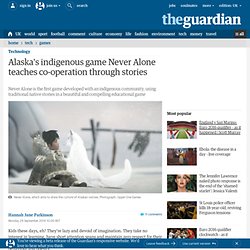
They’re lazy and devoid of imagination. They take no interest in learning, have short attention spans and maintain zero respect for their elders. TreeHugger. Last weekend I went on a camping trip with my family to Gatineau Park in Québec.
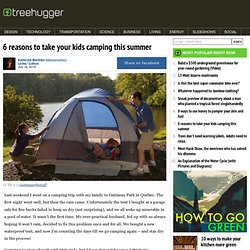
The first night went well, but then the rain came. Unfortunately the tent I bought at a garage sale for five bucks failed to keep us dry (not surprising), and we all woke up miserable in a pool of water. Sorry, gym rats: Why exercising outside may be better for your health. Health Advisor is a regular column where contributors share their knowledge in fields ranging from fitness to psychology, pediatrics to aging.

Follow us @Globe_Health. Now that the weather is blissful, I hope that you’re finding it a bit easier to get outside and be more active. If you are increasing your exercise and activity, that’s great; more physical activity will help your muscles, blood, heart and lungs – pretty much everything in your body. I find that getting outside to exercise is so much better than going to the gym. Nature Playgrounds. Tired of boring old playgrounds?
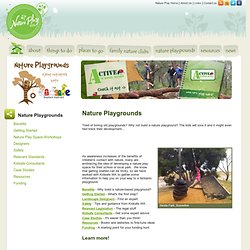
Why not build a nature playground? How green cities are better for us physically and psychologically. Root Gorelick is cagey about sharing details of his work commute; he doesn’t want a sudden uptick in early-morning traffic scaring off the otters.

Or the minks and duck families. To get to his office in the biology building at Carleton University, Prof. Spiritual Ecology. Welcome To OASES. Can you put a price on the beauty of the natural world? George Orwell warned that "the logical end of mechanical progress is to reduce the human being to something resembling a brain in a bottle".
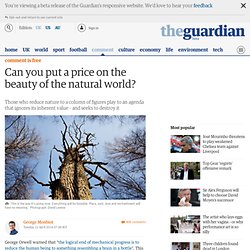
This is a story of how it happens. On the outskirts of Sheffield there is a wood which, some 800 years ago, was used by the monks of Kirkstead Abbey to produce charcoal for smelting iron. For local people, Smithy Wood is freighted with stories. Among the trees you can imagine your way into another world. AABAT Inc. ICE. Journal of the International Community for Ecopsychology. Ecopsychology. UPM - Forest Life. Safeguarding forests for future generations. Forests are one of the Earth's most valuable resources.
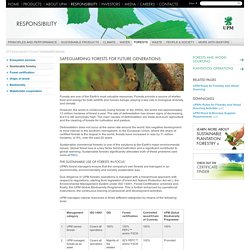
Forests provide a source of shelter, food and energy for both wildlife and human beings, playing a key role in biological diversity and climate. Onsin Research Shows Green Space Keeps You From Feeling Blue, University of Wisconsin School of Medicine and Public Health. Madison, Wisconsin - If you start feeling better as spring begins pushing up its tender shoots, you might be living proof of a trend discovered in data from the Survey of the Health of Wisconsin: The more green space in the neighborhood, the happier people reported feeling.
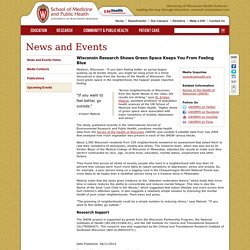
“If you want to feel better, go outside.” - Kristen Malecki “Across neighborhoods of Wisconsin, from the North Woods to the cities, the results are striking,” says Dr. Kristen Malecki, assistant professor of population health sciences at the UW School of Medicine and Public Health. “Higher levels of green space were associated with lower symptoms of anxiety, depression and stress.” Would you be happier living in a greener urban area? This study draws on 18 years of panel data from over 10,000 participants to explore the self-reported psychological health of individuals over time and the relationship between urban green space, wellbeing and mental distress.

Findings show that urban green space can deliver significant benefits for mental wellbeing. The impact of green space was examined through a positive, evaluative measure of wellbeing – life satisfaction – as well a more experiential marker of psychological ill-health – the General Health Questionnaire (GHQ) scale. By using a fixed effects analytic approach more common in economic analyses, the green space effect was estimated without being biased by the personalities of the survey respondents. Want To Be Happy? Live Near A Park. As urban planners debate the merits of, say, a new shopping center versus maintaining the local park, they might consider this: over time, parks—and other green spaces—make people feel better about themselves. Or, at least, that is the takeaway from a long-term study of 12,000 people in the U.K. Researchers at the University of Exeter used survey data measuring both life satisfaction and mental distress, then matched that to a map ranking 32,482 areas for their greenness.
They found that people living in greener areas were consistently more satisfied, and experienced less distress. The work builds on previous studies that also found a green space-mental health link, but had selection issues. Researchers couldn’t say whether it was the green space that made people happier, or whether happy people moved to greener areas. Lead author Mat White says at an individual level the effect isn’t huge, statistically.
For that reason, White suggests planners take mental health into account. BRING DOWN THE BARRIERS! Five Causes of Nature-Deficit Disorder; Five Challenges for the New Nature Movement. Spiritual Ecology. Nature Connection Will Be the Next Big Human Trend Something is amiss and we can't quite put our finger on what. It seems that the further our society progresses, the more disenfranchised we feel. The hyper-connectivity of social media (which has its own potential) leaves us cold and over-informed, saturated with unwanted information and more aware than ever of the injustices of the world. It seems that the more virtually connected we get, the more disconnected we become, both from each other but also from our communities.
I believe that a necessary backlash to this trend is a large-scale reconnection with nature that has the ability to transcend previous environmental movements and reshape our world. Children & Nature Network (C&NN) Why You Should Get Your Kids Outside "For a new generation, nature is more abstraction than reality. " - Richard Louv, Last Child in the Woods What are you doing with your kids this Labor Day weekend?
How about taking a family camping trip? Or going to the beach? Or packing a picnic for the park? The benefits of getting children out into nature are immense and undeniable. The Nature Conservancy has launched a program called Nature Rocks, which is designed to inspire parents to get their children out into the natural environment. With support from Disney, the Conservancy recently surveyed parents of kids between the ages of 3 and 18 in the U.S., Brazil, China, Hong Kong and France. Environmental News and Information. New Ecopsychology. Ecopsychology. This subfield extends beyond the traditional built environment of psychology in order to examine why people continue environmentally damaging behaviour, and to develop methods of positive motivation for adopting sustainable practices.[2] Evidence suggests that many environmentally damaging behaviours are addictive at some level, and thus are more effectively addressed through positive emotional fulfillment rather than by inflicting shame.
Ecopsychology: Restoring the Earth, Healing the Mind: Theodore Roszak, Mary E. Gomes, Allen D. Kanner, Lester R. Brown, James Hillman: 9780871564061: Amazon.com. Children & Nature Network (C&NN) European Journal of Ecopsychology. Tedx Kids Talk — Nature Deficit Disorder. EcoPsiWiki - ees. EES - European Ecopsycology Society.